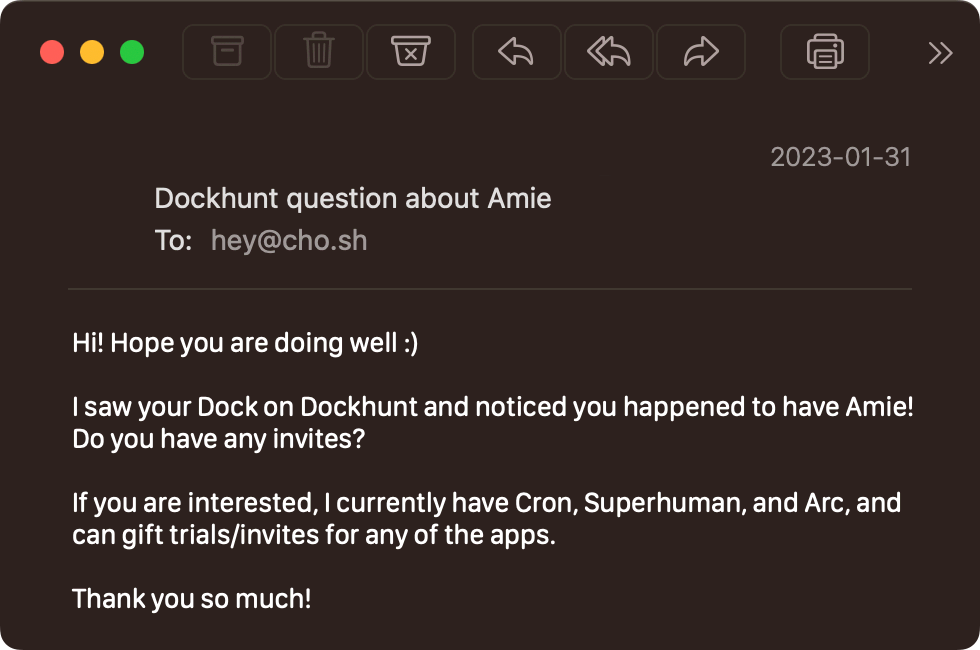이 문서를 언급한 문서들2
Era of Invites
A few days ago, I found people were sharing a website listing the apps they pinned to their dock -- dockhunt.com. So I also added my dock to the website, thinking it is an excellent concept. But not so later, I got an interesting inquiry.

Not only Amie, people asked me if I had any invites for Texts, Tana, Artifact, and so on. But things did not work this way before -- we had an internal alpha phase, then a closed beta as a secretive survey, or an open beta, where I could simply sign up and enjoy the testing. Now an invitation comes in as a somewhat closed-but-open beta. So that leaves us with a question:
Why are all successful startup companies use invitations now?
Survivorship bias, first and foremost. We don't remember when a successful startup product does not have an invitation system, and all unsuccessful startups with an invitation system will never reach your attention. For example, did ChatGPT require an invite? Nope.
That being said, invitation systems do harness some social engineering techniques.
Association with friends. When we invite our friend to the app, that friend will likely download and try out the service, knowing that my buddy recommended the service. After all, it can't go wrong from word of mouth. Similarly, there is a network effect; if I get an invite, I am more prone to share it with my friends, thinking about who would be a good fit for this app.
Avoid operational hazards. Early startups mostly do not have a proper load-balancing system, not to mention the myriad of bugs and errors inside the system. First impressions always last. For me, it was Notion. I first tried Notion in early 2018, and my experience was extremely sluggish and frustrating. It took me two whole years to retry Notion. It will also save the Ops team a lot of work.
Excite and gather the core audience. People crave the unpossessables. With an invite, the company can build a whole experience outside of the company's reach, making a hype-based fan group on social media. Invites are one of the best ways to make people actively seek other users on the platform, echoing more interest throughout the internet. Of course, this eventually builds a Fear of Missing Out (FOMO) -- a topic for another day.
A priceless gift. Combined, an app invitation sometimes feels like a priceless gift when it has nothing to do with exclusivity. Sometimes, this comes with a unique integration; for example, I purchased Superlocal's Early Access Ticket when NFTs were still a thing. OpenSea
Clubhouse. The most significant stimulus for companies must have been Clubhouse, a prime success example of invite-based growth. A picture is worth a thousand words, not to mention a $4B success.
After all, the invitation system is a structured way of conducting beta tests, where it initially used location-based beta tests (early Facebook) or group studies (most games.)
Another interesting observation is that these 'successful, invite-based' software companies are primarily elite small yet mighty teams. So why don't big techs use an invite-based system when launching a new service? Does that imply that provided enough resources, invite-only is inferior to the mass-market opening?
That said, I agree with Nat's view, especially for ② really easy to try. He probably meant the onboarding process, but that includes the installation and getting access to the platform, often blocked with invite locks. I believe there should be a better way for talented technophiles to access the service without an invite; it would be a net benefit for the company.
Not universal, but the pattern I tend to notice in successful new startup products:
- never heard of this, but sounds intriguing
2. really easy to try
3. "HOLY SHIT!" in the first 2 minutes
4. sustained daily usage thereafter— Nat Friedman (@natfriedman) November 24, 2022